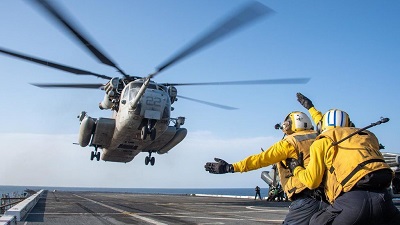
In a move almost unthinkable only three years ago, Gulf Arab navies have held their first joint military exercise with Israeli warships, coordinated by the US Navy.
The five-day drill in the Red Sea involved warships from the United Arab Emirates (UAE), Bahrain, Israel and the US. It began last Wednesday and included boarding, search and seizure tactics “to help ensure freedom of navigation.”
US Naval Forces Central Command said the training would “enhance interoperability between participating forces’ maritime interdiction teams”.
The exercise follows the signing of the Abraham Accords in September 2020, which saw the UAE and Bahrain normalise their relations with Israel. Since then, there has been an intense exchange of diplomatic, military and intelligence contacts between Israel and those Gulf states, as all parties share their concern over Iran’s activities.
The head of Israel’s Mossad intelligence agency has made a public visit to Bahrain and in October, the commander of the UAE’s air force arrived in Israel on his first ever such visit.
Iran, which recently announced its own naval exercises east of the Strait of Hormuz, strongly resents the presence of US and other Western navies in the Gulf region. During the time of the shah, Iran was the dominant local naval force in the area.
Since the Islamic Revolution in 1979, it has frequently called on Gulf Arab states to expel US forces, telling them that Iran is the natural partner for taking care of Gulf security. Their suggestions have fallen on deaf ears as all six Gulf Arab states continue to host US military facilities.
The Saudis, Bahrainis and Emiratis, in particular, remain deeply suspicious of Iran and its Islamic Revolution Guard Corps (IRGC). They have watched with alarm as Iran has successfully defied international sanctions to build up a network of powerful proxy militias across the Middle East.
More than six years of Saudi-led air strikes in Yemen have failed to defeat the Iran-backed Houthi rebels; Hezbollah in Lebanon has grown stronger than ever, and Iran has gained a significant foothold in both Iraq and Syria by funding and arming militias and sending its own forces to bolster the regime of Syria’s President, Bashar al-Assad. -BBC




